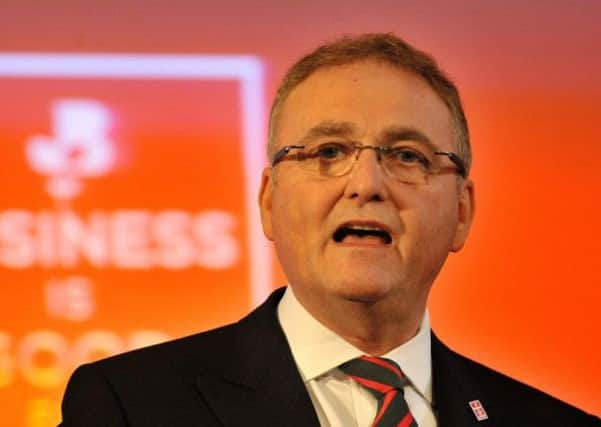John Longworth: A Greek tragedy awaits if we remain shackled to EU


As someone who was the director-general of the British Chambers of Commerce until just a few months ago, I know that business does not speak with one voice in this debate.
As Jeff Immelt, the chairman and chief executive of General Electric, recently said: “It’s important the UK has good relationships around the world, but I don’t really think that its place in the European Union makes that much difference”.
Advertisement
Hide AdAdvertisement
Hide AdAnd you can understand why they wouldn’t be put off if we did decide to leave.
After all, the UK is the largest export destination for some the EU’s most influential countries; our capital city is one of the three “command centres” of the global economy; our language is spoken by billions of people across the globe and last year Britain grew faster than any other major advanced economy in the world apart from America.
None of the things that make Britain successful are down to the EU. In fact it is the EU that holds Britain back. The failure of the EU to strike trade deals with the rest of the world means that Britain loses out on the exciting emerging markets of India, China and the Commonwealth.
Outside the EU, Britain would be like any other country – free to do business with the rest of the world but no longer being subject to every EU rule and regulation. Australia’s economy is less than half the size of the UK, but that did not stop it recently signing bilateral trade deals with China, South Korea and Japan – all in little over two years.
Advertisement
Hide AdAdvertisement
Hide AdBut when we talk about the British economy it’s important to remember that it is small and medium-sized businesses (SMEs) which are most affected by the EU.
From ridiculous rules on bananas to time consuming processes and paperwork, EU regulations cost British businesses more than £125bn per annum by the Treasury department’s own estimate. And despite the fact that just six per cent of UK firms actually export to the EU, all British businesses must abide by the rules and bear the costs of the EU.
SMEs are the backbone of our economy. They account for 99 per cent of all British businesses and employ over 15 million people in Britain today. So by making it harder for them to grow and take on more staff, EU regulation has made the British economy significantly less productive.
But even if we accept that the EU has its problems, we are told that it is better to remain and change the system from within, rather than quitting.
Advertisement
Hide AdAdvertisement
Hide AdAgain I would seriously question whether or not the EU is even interested in reform, let alone open to changes that will benefit British business, and I would point to our own recent renegotiation as evidence of that.
Calls for greater competitiveness were rightly prioritised by the Prime Minister in his talks with other European leaders. And yet, despite British pressure, no specific regulations have been identified as possible barriers to growth.
Nor have any pro-competitive measures been unveiled as part of a genuine effort to strengthen Europe’s economy. In fact the final wording of the document refers merely to a commitment – where feasible – to “burden reduction targets in key sectors”.
And, crucially, the UK did not win the right to stop the Eurozone imposing laws on the British people, with the agreement specifically ruling out a “veto”.
Advertisement
Hide AdAdvertisement
Hide AdOver the next few weeks, the debate about Britain’s membership of the EU will no doubt be interested in the economic consequences of the decision we take. As part of that debate, we are often told that the single market has greatly benefited the UK, but this is simply not true. In fact the UK has benefitted least from the single market as identified by the independent Civitas report.
The Single Market today is not the Common Market which we willingly joined in 1975: it has a common currency, a Parliament, an anthem and a flag. No other trade block in the world has anything close to resembling such a structure, and if it did, I do not believe any nation would willingly join.
And far from reaping the benefits of that decision, over the last 40 years our membership of the EU has led us further away from what we originally intended. The more we integrate within the EU, the more we will be called on to bail out economic crises on the continent and the more we will suffer from the failing Eurozone.
Britain is great in spite of, rather than because of the EU. Only by removing the barriers to prosperity that stand in our way can the UK be more successful: to meet the challenges that are on our doorstep, to be better prepared for those that are on the horizon, and to shape the direction of the 21st century. Britain can do better and that’s why I’ll be voting to leave the EU on June 23.
John Longworth is the former director-general of the British Chambers of Commerce and chairman of the Vote Leave Business Council.